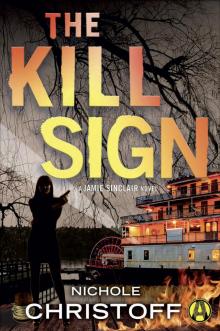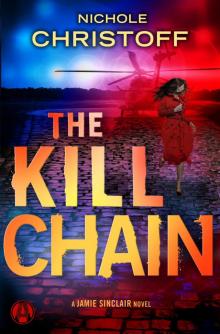- Home
- Nichole Christoff
The Kill List Page 8
The Kill List Read online
Page 8
“I’ll be back,” I warned him.
“Not for twelve hours.”
“Nine,” I said, sailing through the door he held open for me. “The twelve started three hours ago.”
Chapter 10
Like a night owl, I didn’t sleep, but all the same, after I left Barrett’s office I went through the motions.
Rather than taking his advice and heading to a motel beyond the Pershing Gate, I drove through the Town Gate and into the little hamlet of Leeds. There, I turned onto the country lane that still passed for State Route 44. Once, it had been a well-traveled thoroughfare, but Eisenhower’s Interstate plan had put an end to that.
As a result, businesses here had struggled and died. The ones that hadn’t given up the ghost had reinvented themselves—and flourished. The Pines was one of those.
An old-time motor court, its main building now catered to business travelers while the cabins that had once accommodated clients who wanted to eat, sleep, and shower alongside their Model Ts attracted couples for romantic weekends with luxury bed linens, wood-burning fireplaces, and Jacuzzi tubs. I knew this because I’d once lived on Fort Leeds. Of course, in the eyes of the law—not to mention my father—I’d been too young for romantic weekends with luxury bed linens back then.
When I reached the Pines, I collected two keys for two nonromantic rooms. After an incident in Orlando, where I’d had to draw my Beretta on my way to the ice machine, Matty had emphatically suggested I stay near him and any other staffers when we’re on the road. Considering how things could’ve ended up in Florida, I’ve taken that advice ever since.
I entered my room on the wrong side of midnight, grabbed a quick shower, and tried to doze, but the case’s loose facts and a three-year-old’s sweet face kept circling in my mind. Before 5 A.M., a persistent but gentle tapping on my door dragged me from what might’ve been a catnap. Wrapped in a Pines bathrobe and gripping my nine-millimeter, I peeked out front to find Matty on my doorstep, a collection of suitcases arrayed at his feet.
I wished I felt as rested as he looked. But I’d been in New Jersey for twenty-four hours. And Brooke had been missing for twenty-nine.
By 5:41 I’d showered, dressed in fresh clothes, and joined the queue at the Town Gate. The morning rush comes early to a military base, and Fort Leeds was no exception. A smeary rain didn’t help matters.
As I neared the gate, I reached into my glove box. I’d need my registration, proof of insurance, and driver’s license to file for a visitor’s pass and get onto the post—and applying for it would eat up valuable time. But lying on top of my documentation I found a temporary vehicle pass. It had been signed by the Military Police commander himself, Lieutenant Colonel Barrett. I flashed the pass at the gate guards, they waved me through, and from there, I drove straight to Military Police headquarters.
An MP with cropped blond curls and sergeant’s stripes on her sleeve intercepted me just inside the building. Her uniform was rumpled and she had bags under her eyes. But she wasn’t the only one who’d obviously pulled an all-nighter.
Tired federal agents had taken over the MPs’ conference room. Even at this early hour, agents on laptops and cell phones were everywhere. Any leads became plot points on a huge whiteboard at the end of the room.
Kev, in the same shirt and bloodred tie he’d worn yesterday, stood in close conference with Barrett and another man I’d never seen before. Barrett would have to shave soon to stay within regulations, but for now, sandy stubble darkened his jawline. Only the newcomer was shaved, pressed, and well dressed.
Kev left the party to come snipe at me. “Well, look who’s here. Ready for your close-up, Jamie?”
Behind him, a line of televisions had been rolled into the room and tuned to various news channels. Charles Chapman Brown’s mug shot flashed onto every screen. I saw myself slumped on the tailgate of a Philadelphia ambulance as well as speaking to the Newswatch Nine reporter outside Foley’s house. My words to her crawled across the frame in a closed-caption bar.
Charles Chapman Brown is a sick man.
I’m glad he’s getting help.
Belatedly, a photo of Brooke appeared. She was dressed for trick-or-treating in a powder-blue dress and yellow pinafore. Her face was painted like a china doll’s, and her blond curls would’ve put Goldilocks’s to shame. Her Halloween swag bag, brimming with fruit snacks and a coloring book, lay forgotten on the floor. Because Brooke, with stars in her eyes, grinned at the camera as she hugged a fuzzy brown teddy bear.
He was bigger than she was.
Much too quickly, the number for the FBI hotline blinked by. Then the video featuring me and Brown started all over again, making me want to sink through the floor. I’d die before I let Kev Jaeger know that, though.
Reluctantly, he walked me over to Barrett and their guest, Dr. Anderjahn, a local pediatrician.
To me, Barrett said, “It’s not looking good for Brooke this morning.”
“I’m afraid not,” Dr. Anderjahn said. “Three-year-olds with Type I diabetes are unable to recognize signs of low blood sugar, much less communicate the feeling. The risk of severe hypoglycemia is high.”
“Severe hypoglycemia?” I said.
“Coma, Ms. Sinclair. Followed by death.”
So if her abductor didn’t know about her condition, wasn’t prepared to handle it, or just didn’t give a damn, Brooke could be dead already.
My distress must’ve shown on my face, because Dr. Anderjahn patted my hand. “Many children with Type I diabetes live healthy, active lives.”
“Doc,” Kev said, “if her captor’s treating her, what would he need?”
“Testing supplies. Syringes and insulin, of course. Fewer than ten percent of Type I diabetics are under age five. Because of their metabolism, they need to test their glucose level more frequently than, say, teens or adults. They also need multiple small meals and snacks. And a strict schedule. Overnapping by even thirty minutes can have serious consequences.”
“Like coma,” I said. “Followed by death.”
“Yes. But with immediate medical treatment, a child can recover.” Dr. Anderjahn smiled at me. Briefly. “Repeated incidents of severe hypoglycemia, however, can result in permanent brain damage and, often, mental retardation.”
“We’ll check every pharmacy between Wilmington and New York,” Kev said. “If someone’s suddenly started buying supplies for Brooke, we’ll find out.”
“Unless her abductor’s a diabetic himself,” Barrett said. “Or doesn’t know about her condition.”
“Or doesn’t care,” I put in.
That thought didn’t sit well with any of us.
“Lieutenant Colonel Barrett?” A military cop with corporal’s rank on his uniform covered the mouthpiece of the desk phone in his hand. “Line three.”
Barrett snagged a receiver from a nearby phone, punched a button.
When he hung up, he scrubbed a hand across his face.
“Two more kids,” he told us, “are missing from the base.”
Chapter 11
“Close the gates. Nobody leaves the post,” Barrett ordered the corporal. “I want a car with me and everyone else ready to roll.”
“Yes, sir.” The soldier disappeared to make it happen.
“Who called it in?” Kev asked.
He and I had to jog to keep up with Barrett’s stride. From the hallway just beyond the conference room, I heard the unmistakable thud of boots on the floor. Barrett’s MPs were in full scramble mode.
“The grandmother phoned,” Barrett tossed over his shoulder. “Her daughter lives on the post. The son-in-law is active duty. She talks to her daughter every day, but hasn’t heard from her since the day before yesterday. No one answers at the house. When she saw the news about Brooke, she got worried and called the grandkids’ school. No one’s seen them. And no one’s reported them absent.”
“Damn.” Without missing a step, Kev yanked his firearm from the holster under his arm, checked its magazi
ne. It was a big black SIG Sauer, a forty caliber, the Mack truck of semiautomatic handguns.
Barrett jerked a nod at Kev’s weapon. “You won’t need that here in the building, Agent Jaeger.”
“If this is another kidnapping—”
“You’ll be the first person I call. Until then, this is an army matter.”
I expected Barrett to tell me to get lost, too. But he didn’t. When he reached the hallway, I was half a step behind him.
Kev shouted after us. “You’d better not pretty this up, Barrett. If this even smells related to the Thorp abduction, it’s mine!”
Barrett didn’t so much as glance over his shoulder at Special Agent Kevin Jaeger.
I, on the other hand, didn’t hesitate to throw him a dirty look.
Moments later, Barrett and I screeched into the rain-slick lot fronting a row of narrow townhouses, cruiser lights flashing. Though also in the housing area, this block was far from the cluster of officers’ houses where I’d grown up—and where Tim now lived with his new wife and toddler. Both neighborhoods were proof positive that rank does have its privileges. At either end of the command chain. After all, what enlisted man would want his commanding officer peeping over the back fence in the middle of his weekend barbeque?
Here, in conjoined townhomes of yellow brick and white siding, soldiers and their families lived beside their peers. A play structure, wet and solitary, squatted in the center of the cul-de-sac. Minivans rested in every other driveway.
Drawn by the unusual sight of the MP cruiser already parked at the curb, and ours pulling up behind it, bystanders had begun to gather on the sidewalks. Most of them appeared to be civilian stay-at-home moms, huddling under a kaleidoscope of umbrellas with toddlers clinging to their legs. But I spotted off-duty men and women as well.
As a rule, this would be a quiet neighborhood. Anyone with trouble at home would have trouble at work. Serious trouble could mean a letter of reprimand, loss of rank or pay, or even a court-martial.
Because the military was more than a career.
It was a way of life.
Barrett exchanged a quick word with his cops, gestured for them to stay in their car, and headed through the misting rain for a townhouse that looked like all the rest. I followed in his wake. When we reached the concrete stoop of number nine, Barrett rang the bell beside the plain brown door.
No one answered.
He knocked, pounding this time with the side of his fist. “Tony Padilla? Military Police.”
I sensed movement in the house. A moment later, the door cracked open. A bloodshot eye squinted out at us.
“Private Padilla?” Barrett asked.
The door opened all the way. The young man holding the knob blinked at us as if the subdued light of the rainy day was too much for him. Of course, maybe it was. His face was still creased from his pillow. And his rumpled henley and dirty jeans smelled of spilled beer and stale cigarette smoke.
He perked up, though, at the sight of the maple leaves studding Barrett’s collar.
“Private Padilla,” Barrett repeated. “May we come in.”
It wasn’t a question.
“Yes, sir.” Padilla shuffled aside.
As Barrett stepped into the house, his hand settled on the butt of his weapon. The move was merely a precaution. Cops everywhere do it in case they suddenly find themselves in a situation where something is off.
And something in this house was decidedly off. I could feel it as I followed Barrett inside. The feeling was so strong, I nudged my jacket aside and rested my own hand on the butt of my nine.
The entrance gave onto the living room, a space painted that familiar shade of Housing White. The honey oak coffee and end tables, with their gleaming brass candlestick lamps, Precious Moments figurines, and a framed photo of beaming boys with Santa showed signs of a woman’s care. So did the ruffled curtains, the toys tucked into a corner play area, and the crucifix on the wall. But the drawn and dusty blinds, the TV tuned to ESPN, and the crumpled beer cans littering the floor around the sofa suggested Padilla had been keeping house on his own.
That Padilla had spent last night on the couch was also obvious. The cushions were skewed as if he’d gotten up quickly. Their crumpled disarray was a sharp contrast to the precise placement of a throw pillow on the matching armchair.
“How’s Mrs. Padilla this morning?” Barrett asked.
“Beth’s fine, sir. Thank you for asking, sir.”
The young man swayed as he said it. And it hit me. He was drunk.
Barrett, it appeared, had formed that opinion as well. He lifted the only beer can still standing beside the sofa. It was open, and he sloshed it from side to side to judge its content level.
Barrett tipped his head toward the couch. “Why don’t you sit down before you fall down, son?”
Alcohol and anger at being ordered around in his own home had Padilla puffing out his chest. Then sense embarrassed him. Eyes on his stocking feet, he did as Barrett directed.
Barrett said, “When’s the last time you saw your wife, Private?”
Padilla struggled to say the one thing a soldier hates to admit. “I’m not sure, sir.”
“Were you on duty yesterday?”
“Yes, sir.”
“Until when?”
“Four thirty, sir.”
“You stop off on your way home?”
“Yes, sir.”
“Where?”
Padilla’s brow furrowed as he tried to remember. He was a handsome kid, hardly old enough to have kids himself. Then again, it had been some time since soldiers looked like men to me. These days, most of them looked like boys. But this boy’s frame revealed the whipcord army strength civilian men never develop.
With effort, Private Padilla managed to come up with a list of bars. Two, Cheaters and Fanny’s, wouldn’t be hard to locate and weren’t hard to categorize. For generations, strip clubs, porn shops, and blue bars have popped up like fungus around military posts, eager to help soldiers forget their troubles in exchange for some of their pay. Where modern-day female soldiers went to blow off steam, I had no idea. Perhaps they were expected to patronize Payless Shoes and the Cheesecake Factory.
“Was your wife here when you came home?”
“I came home late, sir. I didn’t want to disturb her.”
If Padilla often came home as drunk as he was now, I’d have said he disturbed her plenty.
Gently, very gently, Barrett said, “Are you aware she and your sons have been reported missing?”
The young soldier began to nibble his lower lip.
Barrett plucked the radio from his belt, called the MPs in the car outside, requested they come inside. To Padilla, he said, “Private, I’m going to take a look around upstairs.”
“She’s done this before. She goes to visit her mother. She usually takes the kids. But she comes home. Beth always comes home.”
Young Padilla’s desperation tore at me and, unless I missed my guess, clawed at Barrett, too. He said, “Your wife isn’t with her, soldier. Neither are your kids.”
Padilla’s nibbling turned to gnawing.
Barrett turned for the stairs. I made to follow. But Padilla launched himself off the sofa.
Like a rocket, he flew at Barrett, hitting him in a headlong tackle.
The impact slammed them both into the wall. Plaster fell away under Barrett’s strong shoulder. The young man clung to Barrett’s back, punching him repeatedly in the side of the head and in the kidneys.
Barrett hooked one hand under Padilla’s leg, tried to pull him off, tried to flip him to the floor. It almost worked. But as he twisted to face the young soldier, Padilla slugged him in the jaw.
Barrett crashed into the ruined wall again.
And Padilla grabbed for Barrett’s gun.
A cold sickness flashed through me as the two men grappled for the weapon. Mine would be absolutely useless. While Barrett wrestled Padilla, I’d never get a clear shot.
But I could
n’t do nothing.
I grabbed a brass candlestick lamp from the nearest oak table, stripped its shade, and ripped its cord from the outlet. Gripping it like a baseball bat, I swung. The lamp connected with Padilla’s head, sent him flying sideways.
But it didn’t stop him.
He bounded to his feet, faced me like an enraged bull. Blood flowed from his temple. He didn’t notice—or he didn’t care.
I choked up on the lamp, bracing to swing again.
Padilla charged. But Barrett stepped in front of me. His right cross connected with Padilla’s face. The soldier’s head snapped sideways. And this time, when Padilla went down, he stayed down.
In the sudden silence, Barrett asked, “You okay?”
“Me? What about you?”
Barrett’s chest rose and fell as if he’d run a marathon, but the smile he sent me was as strong as the summer sun. “I’ll live.”
Chapter 12
With Padilla in custody and under treatment for the dent in his skull, Barrett and I swept his house for signs of his missing wife and children. Throughout the place, we found nothing to indicate Beth Padilla planned to leave. Except in the kitchen.
The room was spic and span. A pink apron hung from a peg by the sink. And fruit-shaped magnets held snapshots to the fridge. In one of them, an attractive woman, with a thick black braid worn over her shoulder, smiled at the camera. This, I had no doubt, was Beth Padilla.
But Beth wasn’t here. And in her pretty kitchen, ugly holes punctuated the plaster just to the right of the back door. The holes were the size of a man’s fist.
Barrett confirmed this fact when he held up his own fist for comparison.
“Five of them,” he said. “Someone was ticked.”
“Someone shorter than you. And not much taller than me. Maybe Private Padilla’s size.” In slow motion, I threw a punch the way a man would—from the shoulder—just to see if the height was right.
“Nice,” Barrett remarked. “Did your father the General teach you how to throw a left jab, too?”

 The Kill Wire
The Kill Wire The Kill Box
The Kill Box The Kill Radius
The Kill Radius The Kill Shot
The Kill Shot The Kill Chain
The Kill Chain The Kill List
The Kill List